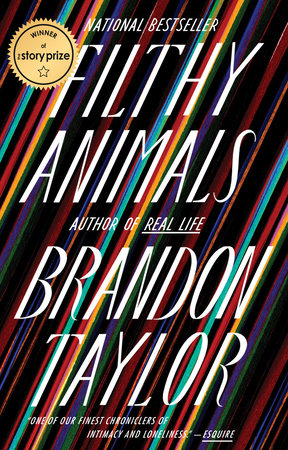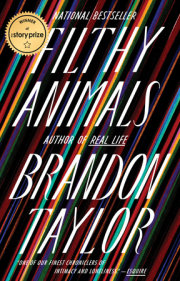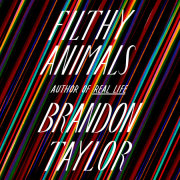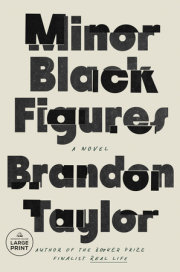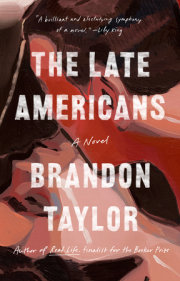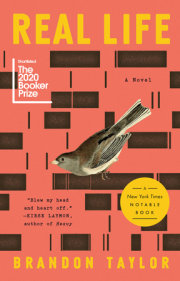Potluck
Lionel had been out of the hospital for only a few days when the potluck invitation came.
The host lived in the first-floor apartment of a Near East Side duplex separated by a tiny cul-de-sac from the wide-bottomed cottages that fronted Lake Monona.
Noise of an undifferentiated party variety drifted out into the deep blue cold, meeting Lionel under the sunroom window, where he had stopped to peer inside. He felt powerfully anonymous out there in the dark, looking in on all of them. That he did not recognize anyone, apart from the host, was at once a comfort and a warning.
A rectangle of pale light unfurled down the stairs as the host pressed the door open on screeching hinges.
"Shit, it's cold out here. You walk all this way?"
Lionel climbed the stairs and tried to arrange his stiff face into a friendly expression, the effort of which made his scalp tingle. He had walked only part of the way, about ten minutes in all. The bus had dropped him on the other side of Orton Park. When the host realized that Lionel wasn't going to answer, he said, "Well, you're right on time."
"I didn't have a chance to go to the store-I just got back," Lionel said. The several pairs of shoes in the front entry hall indicated to him that this was not the small gathering he had thought it would be. It also indicated that he was not right on time, but he knew that already.
"Long trip?" The host wrapped his arm around Lionel's lower back and pulled at him until they were very close, at the threshold of the apartment, but not yet inside. "Good?"
"Couple weeks," Lionel said. "Sorry for not being in touch more."
"It's a busy time," the host said in a way that wasn't entirely not passive aggressive. Lionel turned his head a little out of reflexive guilt, and the host's dry lips grazed the corner of his mouth.
"Thank you," Lionel said.
"It's good to see you. Let's talk tonight. Catch up. It's been forever."
"Yeah, let's."
A few of the guests sat around on mismatched chairs and on the floor, holding plates of damp vegetables and grains. The improvised nature of the gathering diluted the strangeness he felt standing there alone, because although he was clearly a latecomer, the rest of them didn't seem to belong to one another in the way that friends sometimes could. There was no operating logic to their association that he could see. They were all awkward, anxious strangers in the host's living room. He waved to them, and they waved back. Their having seen him and his having seen them moved him.
Lionel felt alive, in the world.
The larger, noisier contingent of guests assembled their food in the kitchen. Lionel waited his turn, watching as they pirouetted and collided. They touched the smalls of each other's backs and shoulders. Men and women. They hugged and kissed and pressed against each other. Looped arms and hooked thumbs into each other's pockets. They poured wine and spooned things onto each other's plates. The loud whack of plastic trays and the tinkle of ice, the hiss of seltzer. As they finished and squeezed by Lionel, he saw that they were about his age, twenty-four, or a little older. They smelled like tobacco and bright, vegetal things-orchids, hydrangeas. They said hey and hi and excuse me, and he stepped back to let them pass.
When the kitchen was empty and everyone had settled down to eat, Lionel made his own plate of baked asparagus, brown rice, kale salad. He leaned against the flaking yellow counter and pushed the food around until it had all been drawn across and through itself. The kitchen was humid, redolent of people and their colognes, shampoos, lotions. But the open window let in a shaft of cold, clear air. The wind whistled as it caught stray openings in the screen.
"Lionel!" the host called from the other room. "Lionel, what are you doing in there? Come on!"
He felt silly being summoned. When he was in the doorway, the host clapped loudly in a way that made the overhead lights flicker brighter in Lionel's vision. His teeth hurt.
"There he is, there he is!"
The others did not clap, which made the host's gesture seem both pitiful and cruel. Lionel could see the full array of people who had come to the potluck. The chubby man on the floor between two chairs kept insisting that he was fine. A blond woman sat with both feet on her chair and a plate balanced on her knees. The host shared the chaise with a couple who looked like siblings, in matching black corduroy pants and gray socks. The woman had a messy topknot, and the man wore his scraggly hair down to his shoulders under a felt baseball cap. An androgynous person, tall, striking, with a platinum buzzcut and septum piercing gestured at a black woman in overalls with pierced cheeks. Some skinny gay men in Breton sweaters, one black-white, the other white-black, were flirting with an equally skinny black man wearing sunglasses. A woman in chinos sat scowling at the space between her knees. Their faces were a wall of pleasant, bland expressions, but then they sank back into their own conversations. The chatter rose above the low music.
Near the defunct fireplace, over which someone had mounted a set of steer horns, Lionel squeezed into an opening on the floor next to a man in a burgundy turtleneck. The man was densely, unnecessarily muscular and looked like someone who enjoyed being looked at and could hold eye contact.
The conversation was difficult to catch. Everyone was talking in extended references to other moments, other events, other parties, and each reference, instead of drawing two things into relation, was instead the whole of the idiom, the entirety of the gesture. Which was fine, okay, he had gone to college with men who talked only in references to Will Ferrell movies and Adam McKay jokes. But he had not gone to these other parties. He had no way of getting inside the reference, the system. He laughed hollowly when other people did, though on a delay, but soon he grew tired of that, the feeling of falseness vibrating in his sinuses. The man next to him kept looking his way, and one or two times their eyes caught, and Lionel wondered at the feeling of recognition he experienced. The two of them were, by some strange bit of luck, on the outside of the conversation, though Lionel suspected that for the man this was intentional. He envied that. The way some people could choose to be in a moment with others or not. It was a choice he didn't have access to, personally. He always felt that he was arriving at the moment just as it was ending and everyone was moving on. He had no sense of timing. But the man's eyes kept catching him, and Lionel started to feel that the two of them, on the outside, had come to rest in their own moment. Their own tempo.
"I'm Charles," the man said eventually.
"Lionel."
"I heard. You're famous now."
"Well, he's like that. He thinks everything is okay as long as he can laugh about it," Lionel said. Charles raised his eyebrows.
"Is that right?"
"Yes," Lionel started to say, but then stopped because he didn't want to be considered a gossip, and Charles had leaned toward him slightly like gossiping was exactly what he had in mind. "He's funny that way."
"You a vegetarian?" Charles asked. The randomness of the remark, coming as it did from out of the ether, wrongfooted Lionel.
"How did you know? Something on my face?"
"Your plate," Charles said. "You're living that grain life."
Lionel, as though he hadn't made up the plate with his own hands, looked down and saw the food assembled there. The rice and kale mixed up. The stalks of asparagus. Oxidizing avocado chunks going soft.
"Guilty."
Lionel looked at Charles's plate. He had two fish portions, the kind with the head still on and the skin all crispy and brown. They looked like brim or something. Lionel had stopped eating meat the year before, when he was in the hospital. There was something so awful about it. Meat was so proximal to death, and he'd spent too much time looking at videos of the commercial food industry while he was in the private care facility. The kind shot on shaky camera phones and involving a lot of panting and rustling clothes, up-close shots of the cows pressing their snouts to mud-streaked bars or lying pathetically on their sides, suffering, with oozing sores and distended abdomens. He wasn't radically vegetarian. He possessed no militant energy whatsoever. But still he felt insecure about it, because the origin of his desire to forgo meat wasn't environmental or even about the animals, really. It was selfish. Because the thought of consuming dead things, when he had been so close to dying, when he had wanted to die, was too much. Lionel waited for Charles to say something dismissive about vegetarians, for that moment when people projected onto him whatever lingering guilt they felt about the consumption of meat.
He missed hamburgers terribly sometimes.
"How do you know our mutual friend?" Charles asked. "I don't think I've seen you at one of his dumb parties before." Lionel was prepared for the abruptness of the transition this time.
"We were in the same department," he said. He had known the host for several years, first when they were undergrad interns in the computer science department-Lionel from Michigan, the host from Arizona. Then both of them had been accepted into the same applied mathematics program at Wisconsin, and they'd been students together there for a few years, though Lionel was more pure math, while the host was working on applications to shielding and space exploration. They met for coffee and lunch after and before seminars and bonded over the fact that neither of them had been math prodigies as kids. They slept together that first, itchy summer, fresh from undergrad and waiting for their lives to change. The host was now on track to graduate early-his project had attracted interest from the Department of Defense, which wanted to turn it into a weapon to be deployed in foreign wars.
"Oh, you're a weird genius too, huh? That must be nice." Charles whistled in fake appreciation.
"Definitely not a genius," Lionel said. The word made him a little queasy. "I'm not in school right now, anyway. I'm on leave."
Charles spun his fork around with a flick of his fingers. The metal flashed as it moved across his wrist and came to rest right side up. He did it again, just like that, a neat little trick.
"Then what do you do?"
"I proctor exams," Lionel said.
"You what now?"
"I give exams for professors. I do entrance exams, too." Lionel's appetite shrank to a tiny white heat in the pit of his stomach. He was ashamed of proctoring only when he had to tell other people about it, and only when those people knew that he had once been a graduate student with good brain chemistry. He didn't think proctoring was bad, but he could see how other people saw him the moment they heard it and how they appraised his life as it was by the metric of what it had once been.
"You're pulling my leg. From math genius to proctor? Is that even a real thing?"
"It is," Lionel said. "It's what I do."
"How'd that happen?"
"I just sort of fell into it," Lionel said.
"Steep fall."
"Not as steep as you'd imagine."
Charles narrowed his eyes but smiled. Lionel felt a crackle of static between them.
"Is that your heart's desire? To proctor?"
"Is your heart's desire to interrogate strangers at a dinner party like a Chekhov character?"
"I don't know what that is," Charles said dryly, and Lionel snorted. The solidity of the sound startled him. Charles went back to spinning his fork.
Lionel resisted the urge to respond, grateful for the opportunity to drop down and out of the conversation. It was clear to him now, in a way that it hadn't been before, that he and every other graduate student depended on the currency of their university affiliations to get by in conversations. As though academia were a satellite constantly pinging, letting him know who and where he was. It wasn't until he had come out of that life that he realized he had no real way of relating to people without it. People looked at him differently when he didn't mention that he'd once been a student or that he had a university affiliation. They looked through him, but the worst part of it was that he sometimes looked through himself in the same way.
"You like it?" Charles asked.
"It gives me time to think," Lionel said. "It's funny. I used to think so fast. Like, sometimes, I felt like I was having six different conversations in my head, all at once. But now it takes me a year just to get to the end of one thought."
"If I were that in my head, I'd kill myself," Charles said. "Sounds awful. Jesus."
The acuity of the words stung Lionel right between the eyes. The air in the room was dense. His tongue felt heavy and numb. Something lodged at the base of his throat when he tried to respond. He coughed experimentally to see if he could clear it, but the hard knot of whatever it was remained stubbornly fixed. His neck bulged under his fingers. His skin was flushed and warm to the touch. He thought briefly that he was having an allergic reaction, that weird sense of driving panic and dry throat. His heart hammered along, and his eyes watered. Even the wool of his sweater itched and burned against his arms. He made another attempt at coughing loose whatever was in his throat. He beat on his chest to break up the tension, but there was no give.
"People do kill themselves," Lionel wheezed. "They do."
"Easy, buddy," Charles said nervously. He slapped Lionel between the shoulders. The jolt of it made Lionel's plate slide from his lap to the floor with a loud thunk. The wilted kale, coated in dressing, and the greasy avocado made a sad little pile.
The conversation, that wall of party noise, dropped away, and it was just the curious silence of the voyeur and the watched. Their attention felt like metal prods inserted into his joints.
"I need," Lionel rasped, but then he stood up on his gummy legs. He went around the back of the chaise, and the host reached for him. The others called out:
Copyright © 2021 by Brandon Taylor. All rights reserved. No part of this excerpt may be reproduced or reprinted without permission in writing from the publisher.

